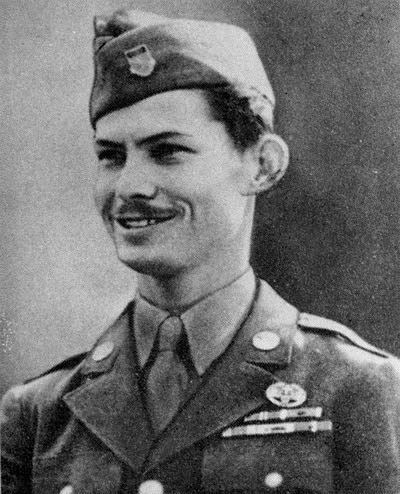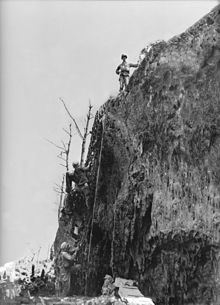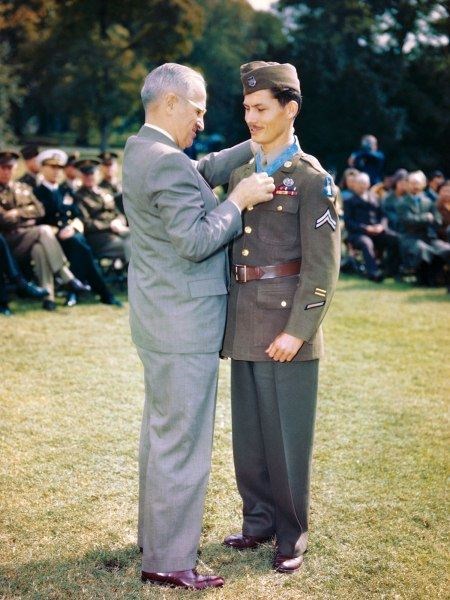 Desmond Thomas Doss (1945)Wikipedia.com
Desmond Thomas Doss (1945)Wikipedia.com
World War II involved nearly every part of the world. The world was menaced by Adolf Hitler’s Nazi Germany, Benito Mussolini’s Italy, and the Empire of Japan. The allies banded together - the United Kingdom, China, the United States, the Soviet Union, and France. The death toll was devastating. World War II claimed between 50 million and 80 million lives. The United States awarded the Medal of Honor to 464 men who fought in that war. This is the the highest military honor given in our country. The Medal of Honor recognizes those who distinguish themselves at the risk of their own life against an enemy of the United States. The Medal of Honor was awarded top only one conscientious objector who served in World War II. Desmond Doss was the first conscientious objector to receive the Medal of Honor. A Conscientious Objector is “An individual who has claimed the right to refuse to perform military service”(Kosmopoulpos). Desmond Doss was a devout Seventh Day Adventist, a Protestant Christian denomination that observes Saturday as the seventh day of the week as the holy day, much like Jews. Desmond Doss grew up in Lynchburg, Virginia. As a small boy, he found himself fascinated with a framed poster of the Ten Commandments, especially the sixth commandment, “Thou Shalt Not Kill.” Desmond Doss’s strong religious beliefs resulted in his refusal to carry a weapon, even after he was drafted into the army and found himself in active combat in World War II in the South Pacific, including Japan. His bravery, faith and selflessness are traits to inspire, making him a hero. A hero sets themselves apart, either through their acts, their beliefs or their circumstances. Private First Class Desmond Doss, motivated by his strong religious faith, put himself at risk of death, to save others at risk, the ultimate act of selflessness.
 Doss standing Maeda Escarpment, JapanWikipedia.comDesmond’s selfless behavior is one of his traits that makes him a hero. Doss’s beliefs meant that caring for others was more important that oneself. He refused to put his own welfare above those of his fellow soldiers. “The citation credited him with saving 75 soldiers on that ridge, but he later said that the number was probably closer to 50”(Goldstein). Doss’ actions at the Maeda Escarpment was just one of the battles in which he showed his heroism and selflessness. Doss’s modesty shows he claimed saving only 50, showing that he does not want to be famous because of it but he does it just because he wants to help others. Desmond’s selflessness began even before he joined the United States Army. When at home in Lynchburg, he was called to his own form of duty. “One patient, an indigent-aged man with no friends or relatives left in the world-was dying from an incurable disease. He could not afford a nurse, and Desmond volunteered to stay with him”(Herndon 26). Doss believed that even a dying, needy person has a chance to have someone by his side, and Doss was more than willing to be that someone. Doss cared for everyone in his community no matter who they are, because he knew that they were people who are just as important as he was. Desmond Doss’s selfless character is a part of him that makes him a hero, caring for those in need.
Doss standing Maeda Escarpment, JapanWikipedia.comDesmond’s selfless behavior is one of his traits that makes him a hero. Doss’s beliefs meant that caring for others was more important that oneself. He refused to put his own welfare above those of his fellow soldiers. “The citation credited him with saving 75 soldiers on that ridge, but he later said that the number was probably closer to 50”(Goldstein). Doss’ actions at the Maeda Escarpment was just one of the battles in which he showed his heroism and selflessness. Doss’s modesty shows he claimed saving only 50, showing that he does not want to be famous because of it but he does it just because he wants to help others. Desmond’s selflessness began even before he joined the United States Army. When at home in Lynchburg, he was called to his own form of duty. “One patient, an indigent-aged man with no friends or relatives left in the world-was dying from an incurable disease. He could not afford a nurse, and Desmond volunteered to stay with him”(Herndon 26). Doss believed that even a dying, needy person has a chance to have someone by his side, and Doss was more than willing to be that someone. Doss cared for everyone in his community no matter who they are, because he knew that they were people who are just as important as he was. Desmond Doss’s selfless character is a part of him that makes him a hero, caring for those in need.
Doss’s religious and unwavering faith led him through his entire life, and his time in combat during World War II. “Mr. Doss, a member of the Seventh Day Adventist Church, was guided all through his years by a framed poster of the Ten Commandments.” It was the framed poster in his parents’ home in Lynchburg, Virginia, that had a profound effect on how he would deal with the thought of carrying a weapon and his acts of faith and bravery during wartime. Because his beliefs extended to the Sixth Commandment, “Thou Shalt not Kill,” Doss refused to carry a weapon, even though his fellow soldiers ridiculed him for not wanting to at least protect himself. He believed that his faith and the Bible were his best protectors. Since Doss refused to bear arms and harm anyone including an enemy combatant, the most logical assignment for him, and one which he sought and accepted humbly, was as a medic. “he was given conscientious objector status, having declined to bear arms because of his religious principles. He became a medic, the only way he could adhere to the Sixth Commandment as well as the Fourth Commandment, to honor the Sabbath”(Goldstein). Doss’ position as a medic allowed him to be true to his faith and beliefs, yet save lives in the work that he did. His work as a medic saved many lives over many different battles during World War II. His work enabled many soldiers to return to their homes and loved ones, a result that would not otherwise would have happened. Doss even stuck to his regiment of observing the Saturday holy day, refusing to be in combat on those days with few exceptions. Doss’s religious beliefs guided him through the entire war, and nearly every decision he made. It is rare indeed for men to hold so strongly to their beliefs in such horrific circumstances, as those that put Doss in harm’s way every day of the war. Despite the danger he was in and the social pressure from his peers, Doss was able to distinguish himself with pride and with his faith.
 Doss receiving Medal of HonorPeople.comPrivate First Class Desmond Doss distinguished himself as a hero in the deadliest war ever, by holding true to his religious faith and his core value of selflessness. He is a true American hero. Holding firm to his upbringing in Lynchburg, Virginia as a Seventh Day Adventist, Doss refused to carry a weapon and was named a “conscientious objector.” By refusing to carry a weapon, he put himself at risk of death in an ear that claimed 50 million to 80 million lives. However, he was a true hero and showed his core value of selflessness when he became a medic, saving many lives over many battles. It was his belief that “Thou Shalt Not Kill” that carried him through the war. Doss is an inspiration in that he held tightly to his beliefs, even in circumstances when most people would not. He bucked conformity at every juncture where it did not sync with his beliefs -- he refused to be in combat or training on Saturdays, he refused to carry a weapon, and he put the welfare and lives of others above his own. His unwavering commitment to his faith and the Ten Commandments is an inspiration. Few people are so consistent and rigorous. This is likely why he was awarded the Medal of Honor, the highest award given in the United States military. Doss would never let his fellow soldiers down stating, “I had these men up there and I shouldn’t leave them. They were my buddies, some of my men with families. And they trust me. I didn’t feel like I should value my life above my buddies. And so I decided to stay with them”(Doss). Doss’s bravery, selflessness, and faith is what makes him a deserving hero and an inspiration to all of us.
Doss receiving Medal of HonorPeople.comPrivate First Class Desmond Doss distinguished himself as a hero in the deadliest war ever, by holding true to his religious faith and his core value of selflessness. He is a true American hero. Holding firm to his upbringing in Lynchburg, Virginia as a Seventh Day Adventist, Doss refused to carry a weapon and was named a “conscientious objector.” By refusing to carry a weapon, he put himself at risk of death in an ear that claimed 50 million to 80 million lives. However, he was a true hero and showed his core value of selflessness when he became a medic, saving many lives over many battles. It was his belief that “Thou Shalt Not Kill” that carried him through the war. Doss is an inspiration in that he held tightly to his beliefs, even in circumstances when most people would not. He bucked conformity at every juncture where it did not sync with his beliefs -- he refused to be in combat or training on Saturdays, he refused to carry a weapon, and he put the welfare and lives of others above his own. His unwavering commitment to his faith and the Ten Commandments is an inspiration. Few people are so consistent and rigorous. This is likely why he was awarded the Medal of Honor, the highest award given in the United States military. Doss would never let his fellow soldiers down stating, “I had these men up there and I shouldn’t leave them. They were my buddies, some of my men with families. And they trust me. I didn’t feel like I should value my life above my buddies. And so I decided to stay with them”(Doss). Doss’s bravery, selflessness, and faith is what makes him a deserving hero and an inspiration to all of us.
Works Cited
Herndon, Booton. Redemption at Hacksaw Ridge: the Gripping True Story That Inspired the Movie. Remnant Publications, 2016.
“Doss, Desmond,” Charity Navigator Four Star Charity, (2017 Congressional Medal of Honor Foundation)
https://themedalofhonor.com/medal-of-honor-recipients/recipients/doss-desmond-world-war-two
Kosmopoulos, Giorgos. “The Right to Refuse to Kill.” The New Federalist, Webzine of the Young European Federalists, The New Federalist, Webzine of the Young European Federalists, 29 Jan. 2010,
www.thenewfederalist.eu/The-right-to-refuse-to-kill.
Page created on 2/13/2018 7:59:50 PM
Last edited 2/15/2018 7:42:55 PM
